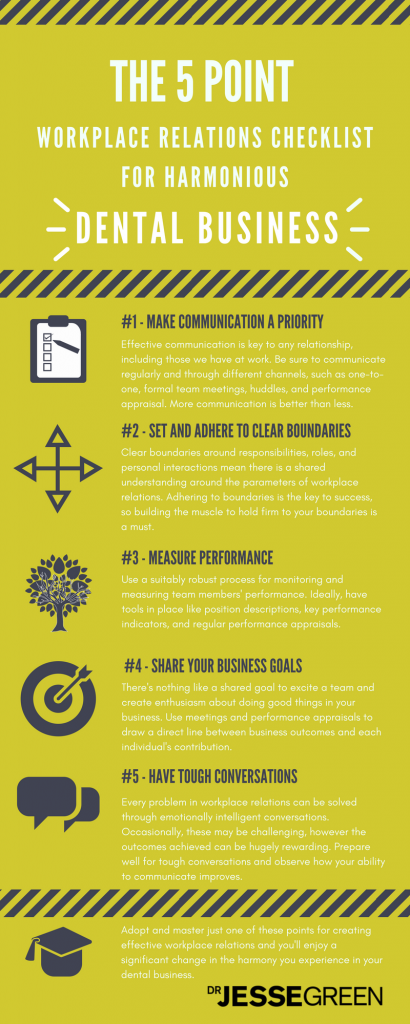There’s no doubt workplace relations in dental business can be challenging.
True for even the most emotionally intelligent among we dental entrepreneurs, it’s an area of business that requires ongoing care and attention. Occasionally, it even requires a tough conversation or two.
But what if I was to tell you it is possible to enjoy harmonious workplace relations? What if there were some key principles that could be implemented to transform outcomes in this area?
My recent interview with Catherine Gillespie of Harmonious Workplace Relations reminded me that it’s possible and achievable.
Read on to discover how.
#1 Make Communication A Priority for Workplace Relations
Okay, so no rocket science here.
We all know effective communication in the workplace is pivotal for harmonious relationships, so why does it seem so elusive?
Well, there’s communication – and communication that works. And it looks like this:
You hold regular meetings, both formal and informal. In a savvy dental business, this might translate as a weekly team meeting and daily huddle.
Information shared is relevant and makes sense to the team. At times, this information may need to be a little more targeted. For example, drawing a direct line between the practice’s financial performance – and each individual’s performance – can be a real eye opener.
Communication can also take the form of employee feedback. Regular performance appraisals against position descriptions and key performance indicators are vital. Equally important is more informal feedback that occurs in daily business operations.
Without these mechanisms for communication that occur at different levels of interaction, there are huge openings for misunderstanding, judgement and conflict.
And they can be avoided with solid communication.
#2 Set and Adhere to Clear Boundaries
I understand this is easier said than done in a dental practice. Daily, we are literally in close proximity to our team, and it is very easy to discern friendly with friend.
I’ve been guilty of it myself. However, what I’ve learned through experience is that clear boundaries are vital. Around workplace relations, it is a far healthier way to manage personal interaction with team members.
Am I saying, don’t ask about a person’s weekend or family member who’s not well? No.
What I am saying is avoid getting hooked into the emotion or story around the conversation. And if a team member is really struggling with an issue, guide them towards seeking assistance from an external third party.
It’s a healthier approach for all concerned.
#3 Measure Performance to Manage Workplace Relations
One area where dental business owners come unstuck is not having robust enough measures in place to keep team members accountable.
Although it might seem like it’s a tough approach, what’s really tough is when you try to hold a person accountable for their performance, but you’ve got nothing to measure their performance with.
This is where position descriptions and key performance indicators are incredibly helpful. Outlining tasks and responsibilities, they are great tools for matching up business goals with individual performance. Instead of a person thinking they’re flying solo, they can make the mental shift to seeing themselves as part of a team.
Develop these tools and you’ll always have a reference point for individual accountability.
#4 Share Your Business Goals
It’s hard for a person to feel they’re part of something bigger than themselves if they have no idea about that ‘bigger something’.
Share your vision for the business. Invite team members to be part of the vision’s unfolding. Be enthusiastic about contributions.
Team members who are excited by the vision will respond. Those who don’t will eventually weed themselves out, creating the ideal opportunity to bring in even more support for the unfolding of your business vision.
#5 Have Tough Conversations
As a general rule, human beings tend to shy away from tough conversations. We prefer harmony over conflict, but little do we realise by avoiding those hard conversations, we actually put harmonious workplace relations at risk.
Tough conversations take courage. They also require strategy, planning and writing things down.
Every dental business owner will have had the experience of a tough conversation not going so well.
In my own experience, I can say any less than ideal outcome was due in large measure to a lack of preparation. I didn’t really think through the message, delivery or outcome.
So how do we have a tough conversation?
Be prepared to call out the elephant in the room. Is someone communicating in a negative way? Great, then state what you’ve observed and ask why.
Have tough conversations early, not at the point of (almost) no return.
Prepare well. This helps take the emotion out of tough discussions and navigate more easily towards a resolution. You might even develop your approach with the help of a coach or mentor.
Be specific. If there’s a behaviour or task that’s in question, focus on that, not the peripheral ‘story’ associated with it.
Maintain a forward focus. Asking the question, How do we move forward from here? is vital. It means the tough conversation is just for starters. The follow through on remedial actions by all parties is the true measure of whether constructive change has arisen out of the conflict. Periodic check ins are a must: a week, month and beyond the hard conversation.
It gives you the best chance of bringing about the harmonious workplace relations you’re working towards.
Final Words…
I like to think of harmonious workplace relations as something that is achievable and worth investing in.
Every relationship needs attention, including those with our team members.
For these important relationships to function in healthy ways, it’s up to us, as the business leaders, to develop skills that deliver harmony.




